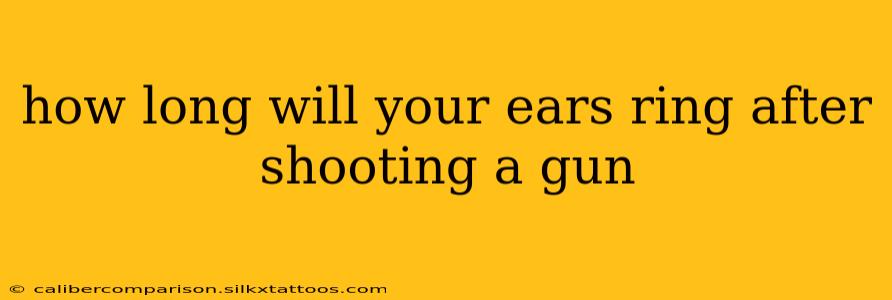How Long Will Your Ears Ring After Shooting a Gun? Understanding Temporary and Permanent Hearing Loss
The ringing in your ears after shooting a gun, known as tinnitus, is a common experience. However, the duration and severity of this tinnitus vary greatly depending on several factors, ranging from the type of firearm used and the hearing protection employed to individual susceptibility and the overall noise exposure. Understanding the potential consequences is crucial for responsible firearm handling and hearing preservation.
Factors Influencing the Duration of Tinnitus After Shooting
Several factors determine how long your ears will ring after shooting a gun:
-
Type of Firearm: Larger caliber firearms, shotguns, and even some high-powered rifles produce significantly louder sounds than smaller handguns. The higher the decibel level, the greater the potential for prolonged tinnitus and even permanent hearing damage.
-
Hearing Protection: Proper hearing protection is paramount. Using hearing protection, such as earmuffs or earplugs (ideally both), significantly reduces the noise exposure and minimizes the risk of both temporary and permanent hearing loss. The type and quality of hearing protection also play a role; custom-fitted earplugs often provide better protection than generic foam plugs.
-
Distance from the Firearm: Being closer to the firearm during discharge exposes your ears to a much higher sound intensity. The closer you are, the longer and more intense the ringing may be.
-
Number of Shots: Firing multiple rounds without sufficient breaks exacerbates noise exposure and increases the likelihood of prolonged tinnitus and potential hearing damage.
-
Individual Susceptibility: Some individuals are more susceptible to noise-induced hearing loss than others. Pre-existing conditions or genetic factors can influence an individual's response to loud noises.
Differentiating Between Temporary and Permanent Tinnitus
The ringing in your ears after shooting might be temporary or permanent. Temporary tinnitus typically resolves within a few hours or days, while permanent tinnitus can persist indefinitely.
Temporary Tinnitus: This is a common experience after exposure to loud noises, including gunfire. The ringing usually fades gradually, and there's no permanent hearing damage. However, repeated episodes of temporary tinnitus increase the risk of developing permanent hearing loss.
Permanent Tinnitus: This is a more serious condition characterized by persistent ringing, buzzing, or other sounds in the ears. It can significantly impact quality of life, causing sleep disturbances, anxiety, and depression. Permanent tinnitus is often a consequence of prolonged or intense noise exposure, including repeated exposure to gunfire without adequate hearing protection.
Protecting Your Hearing While Shooting
Preventing hearing damage is far more effective than treating it. Always prioritize these preventative measures:
-
Wear Hearing Protection: Use both earmuffs and earplugs for maximum protection. Ensure they fit properly and are in good condition.
-
Maintain Safe Distances: Avoid standing too close to the firearm when shooting.
-
Limit Exposure: Take breaks between shooting sessions to allow your ears to recover.
-
Regular Hearing Checks: If you frequently shoot firearms, consider regular hearing tests to monitor your hearing health.
When to Seek Medical Attention
If your tinnitus lasts longer than a few days, is severe, or accompanied by other symptoms like dizziness or hearing loss, seek medical attention immediately. A healthcare professional can assess your hearing, determine the extent of any damage, and recommend appropriate treatment.
Disclaimer: This information is for general knowledge and does not constitute medical advice. Always consult a healthcare professional for any concerns about your hearing.

